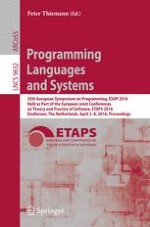2016 | OriginalPaper | Chapter
Probabilistic Functions and Cryptographic Oracles in Higher Order Logic
Author : Andreas Lochbihler
Published in: Programming Languages and Systems
Publisher: Springer Berlin Heidelberg
Activate our intelligent search to find suitable subject content or patents.
Select sections of text to find matching patents with Artificial Intelligence. powered by
Select sections of text to find additional relevant content using AI-assisted search. powered by














